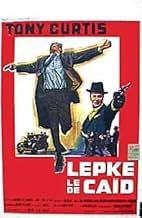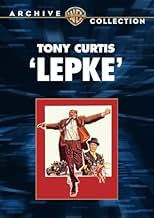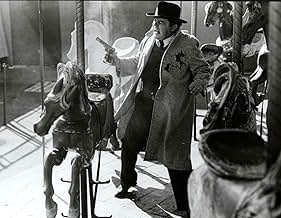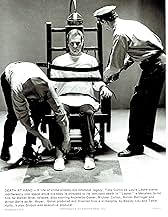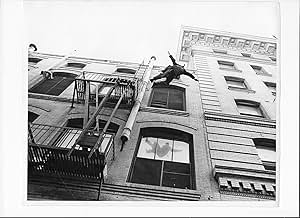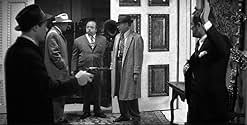Louis 'Lepke' Buchalter is head of Murder Inc., the syndicate that spattered the headlines of the day with blood.Louis 'Lepke' Buchalter is head of Murder Inc., the syndicate that spattered the headlines of the day with blood.Louis 'Lepke' Buchalter is head of Murder Inc., the syndicate that spattered the headlines of the day with blood.
Featured reviews
A cross between yet another 1970's THE GODFATHER clone and a drive-in exploitation with sex and violence, future Cannon Films co-owner Menahem Golan directs Tony Curtis as LEPKE... beginning with a younger version with an intense Barry Miller in turn-of-the-century America, committing a crime and about to be locked up... a shame since more time should have been spent on those youthful years...
Instead, right when the titular Jewish mobster gets out, he's already a 50-something miscast Tony Curtis, who at one point talks Milton Berle into marrying docile daughter Anjanette Comer... and about thirty-minutes later, when the detectives start knocking, she's supposed to have realized her mistake at marrying a lethal crime boss...
The shame is that we never experience Lepke's climb from rags to riches, nor do we get any inclination of how all the dirty work goes down... with the exception of a deliciously lethal short Italian who takes out Lepke's enemies...
So it's never exactly clear why he has either crooked friends or dangerous enemies since scene-after-scene entails dialogue more about crime than acting upon it... hopscotching into violent deaths (one has a mobster cutting the neck of a hooker while having sex) that, while pushing the R-rated envelope, has little content inside: what's here (including Vic Tayback and THE GODFATHER brother-in-law Gianni Russo) seems more of a 2-hour TV-movie trailer than a fulfilling cinematic mob biopic.
Instead, right when the titular Jewish mobster gets out, he's already a 50-something miscast Tony Curtis, who at one point talks Milton Berle into marrying docile daughter Anjanette Comer... and about thirty-minutes later, when the detectives start knocking, she's supposed to have realized her mistake at marrying a lethal crime boss...
The shame is that we never experience Lepke's climb from rags to riches, nor do we get any inclination of how all the dirty work goes down... with the exception of a deliciously lethal short Italian who takes out Lepke's enemies...
So it's never exactly clear why he has either crooked friends or dangerous enemies since scene-after-scene entails dialogue more about crime than acting upon it... hopscotching into violent deaths (one has a mobster cutting the neck of a hooker while having sex) that, while pushing the R-rated envelope, has little content inside: what's here (including Vic Tayback and THE GODFATHER brother-in-law Gianni Russo) seems more of a 2-hour TV-movie trailer than a fulfilling cinematic mob biopic.
Brutal, straightforward bio-pic of the notorious Jewish gang boss. Writers Wesley Lau and Tamar Hoffs tell their sprawling story with fidelity to the headlines and nary a hint of what made this complicated mobster-cum-family man tick. (Curiously, there's never a mention of Lepke's infamous Murder Inc. operation, opting instead to concentrate on his drug trafficking and extortion enterprises.) Luckily, Tony Curtis' riveting performance fills in what the writers' have neglected, transforming Lepke Buchalter into a disturbingly three-dimensional character. Tossing off Yiddishisms with a sneer, keeping his impish smile to a minimum, he plays Lepke as a stone-faced ruthless street thug with a yen for power and conservative family values. It's as though Sidney Falco from "Sweet Smell of Success" had finally taken over J.J. Hunsecker's column. Whether snarling out death orders or tremulously asking his prospective father in law for permission to marry, Curtis invests the role with a skillful understatement (as well as a Bronx boy's veracity).
In the film's best scene, a queasy mixture of eroticism and complex emotions, Lepke is on the lam and holed up in a trollop's apartment. As the woman brazenly tempts him, Curtis silently and eloquently conveys the anguish of a lonely man struggling to remain faithful to his wife.
The director Menachem Golan is rarely this subtle, striving for ethnic texture and period color and overdoing both. Grubby hook-nosed Jews, swarthy pasta-eating Italians, and outsize Fedoras are shoved in our face. The violence is luridly overblown (a prostitute gets an ice pick thrust in her neck during lovemaking), and sometimes downright preposterous (a plate of spaghetti camouflages an explosive device). But just try to turn away from Curtis. With Anjanette Comer as Lepke's doting wife; Milton Berle, surprisingly restrained as her father; Barry Miller as the young Lepke; Vaughn Meader as an unlikely Walter Winchell.
In the film's best scene, a queasy mixture of eroticism and complex emotions, Lepke is on the lam and holed up in a trollop's apartment. As the woman brazenly tempts him, Curtis silently and eloquently conveys the anguish of a lonely man struggling to remain faithful to his wife.
The director Menachem Golan is rarely this subtle, striving for ethnic texture and period color and overdoing both. Grubby hook-nosed Jews, swarthy pasta-eating Italians, and outsize Fedoras are shoved in our face. The violence is luridly overblown (a prostitute gets an ice pick thrust in her neck during lovemaking), and sometimes downright preposterous (a plate of spaghetti camouflages an explosive device). But just try to turn away from Curtis. With Anjanette Comer as Lepke's doting wife; Milton Berle, surprisingly restrained as her father; Barry Miller as the young Lepke; Vaughn Meader as an unlikely Walter Winchell.
The success of The Godfather films I and II certainly led to revival of the gangster film. Golan/Globus of Israel apparently decided that the Italians should not monopolize the epic gangster genre that The Godfather created so the film Lepke was born about the Jewish mob Murder Inc. from the 30s and 40s.
To say that Lepke is factual is to give it way too much credence. Though Thomas E. Dewey as special prosecutor and later New York County District Attorney certainly had Murder Inc under his sites the final conviction that sent Louis 'Lepke' Burkhalter to the electric chair was done in Murder Inc.'s own backyard of Kings County better known as Brooklyn. And Lepke was not the sole voice against a hit on Dewey, Charlie Luciano played here by Vic Tayback had more to do with it than Lepke. And Benjamin Siegel, AKA Bugsy who is a peripheral character in the film is addressed by one of his peers as Bugsy, as was told to us truthfully in Warren Beatty's film by one of his peers, that was one big no-no. It was name that Siegel did not appreciate.
Still Tony Curtis gives a compelling portrait of Lepke who when he wasn't dealing dope and extorting money from businesses for protection or muscling in on unions was by all accounts an exemplary family man. Anjanette Comer plays his wife and Milton Berle his father-in-law and Berle plays it totally straight, no Uncle Milty shtick.
Golan/Globus certainly got the ambiance right, but the fictional Corleones were given an epic quality that Lepke just doesn't have. Francis Ford Coppola certainly had a better vision than Golan/Globus had for Lepke.
But I would still recommend seeing Lepke and then reading about Murder Inc. to see just how factual the film was. And for what Tony Curtis did in the title role.
To say that Lepke is factual is to give it way too much credence. Though Thomas E. Dewey as special prosecutor and later New York County District Attorney certainly had Murder Inc under his sites the final conviction that sent Louis 'Lepke' Burkhalter to the electric chair was done in Murder Inc.'s own backyard of Kings County better known as Brooklyn. And Lepke was not the sole voice against a hit on Dewey, Charlie Luciano played here by Vic Tayback had more to do with it than Lepke. And Benjamin Siegel, AKA Bugsy who is a peripheral character in the film is addressed by one of his peers as Bugsy, as was told to us truthfully in Warren Beatty's film by one of his peers, that was one big no-no. It was name that Siegel did not appreciate.
Still Tony Curtis gives a compelling portrait of Lepke who when he wasn't dealing dope and extorting money from businesses for protection or muscling in on unions was by all accounts an exemplary family man. Anjanette Comer plays his wife and Milton Berle his father-in-law and Berle plays it totally straight, no Uncle Milty shtick.
Golan/Globus certainly got the ambiance right, but the fictional Corleones were given an epic quality that Lepke just doesn't have. Francis Ford Coppola certainly had a better vision than Golan/Globus had for Lepke.
But I would still recommend seeing Lepke and then reading about Murder Inc. to see just how factual the film was. And for what Tony Curtis did in the title role.
Lepke traces the beginnings of Louis Lepke Buchalter from his days as a child thief to his eventual demise at the hands--or feet, if you will--of Old Sparky.
Pros: Tony Curtis gives an excellent performance as Lepke, conveying charm as well as ruthlessness. The other actors involved also give decent performances, particularly Milton Berle as Lepke's father-in-law.
As for the cons, the period sets don't look authentic. There was a big change in the streets and nightclubs from the 1920's to the 1940's in New York--not in this movie. Additionally, it's shown that Jack "Legs" Diamond was murdered by a contract killer, an ice pick in his ear. Nope. He was murdered in bed by at least three people. I guess killing him the old-fashioned way wasn't colorful enough for the producers.
Altogether, the film is fun to watch, buoyed by Curtis' performance, even though he doesn't age very much during his rise and eventual fall. But it's hardly accurate.
Pros: Tony Curtis gives an excellent performance as Lepke, conveying charm as well as ruthlessness. The other actors involved also give decent performances, particularly Milton Berle as Lepke's father-in-law.
As for the cons, the period sets don't look authentic. There was a big change in the streets and nightclubs from the 1920's to the 1940's in New York--not in this movie. Additionally, it's shown that Jack "Legs" Diamond was murdered by a contract killer, an ice pick in his ear. Nope. He was murdered in bed by at least three people. I guess killing him the old-fashioned way wasn't colorful enough for the producers.
Altogether, the film is fun to watch, buoyed by Curtis' performance, even though he doesn't age very much during his rise and eventual fall. But it's hardly accurate.
I have the 1975 paperback version of Lepke in my possession, and there are some scenes and characters in the book that never appeared in the movie.
The book opens with Lepke's body being brought out of Sing Sing on a sheet-covered stretcher. After the prison guards put his body in a truck and take it away, the novel then goes to the beginning chapter of Lepke's life.
It is the summer of 1912 in Brooklyn. We meet Lepke and all his associates as teenagers. The book mentions that Lepke was born on February 12, 1897. Lepke's father died suddenly and his mother claims that Lepke "was the death of him".
After Lepke commits his first robbery at a shoestore, he's sentenced to his first prison term at Sing Sing. He gets raped by a convict named Al, and gets beaten up by a convict mob for informing on him.
In 1922, Lepke gets released from prison and goes back to live in his family's old apartment. His mother has moved away to Colorado, and we don't know where his sister is.
Lepke goes to work for a gangster named Augie Orgen. After some disagreemnts with Augie, Lepke guns him down in front of a nightclub. He's quick to also bump off the eyewitnesses to the killing. He has his henchmen run down the club's doorman with their car, and has Augie's girlfriend and a real-life gangster named Legs Diamond killed with ice-pick stabbings. In real life, Diamond was gunned down by members of a rival gang.
Lepke makes friends with Lucky Luciano and Albert Anastasia, but soon things go downhill between them. They try to take over the garment industry, which is Lepke's territory, by exploding a bomb in a clothing warehouse. For a short while they form a union, which is threatened by crusading prosecutor Thomas Dewey. Dutch Schultz says they should kill Dewey before he gets enough evidence on him. Lepke refuses Schultz permission to carry out the hit, and Schultz angrily storms out of the meeting, saying he will do it himself. Apparently this is what led to the murder of Schultz and several of his henchmen at a restaurant in 1935.
Soon Lepke moves up from garments and into the business of illegal gambling. He opens up a slot machine joint, but Anastasia wants control of it, so he has Gino, one of his hoods, plant a bomb in one of the slot machines. A drunken man pulls the lever and the whole place goes kaboom. This starts another war between the Jewish and Italian gangs.
Lepke retaliates by having his men gun Gino down. In the movie, Gino was killed (or injured) by a bomb planted in his dish of spaghetti. Then Lepke gets into the drugs business, which makes Dewey start a crusade to bring him to justice. After Lepke is briefly detained and released by the FBI, he discovers that a shopkeeper named Joe Rosen squealed on him. Lepke has him bumped off, which only intensifies Dewey's crusade.
Lepke goes on the run for several years, and he finally turns himself in after striking a deal between himself and J. Edgar Hoover.
He is eventually convicted on all counts, including murder, and is sentenced to the electric chair.
Lepke is a great movie with a great cast, especially Tony Curtis (in the title role) and Milton Berle (as Lepke's father-in-law). Curtis and Berle both give excellent dramatic performances.
Rating: ****
The book opens with Lepke's body being brought out of Sing Sing on a sheet-covered stretcher. After the prison guards put his body in a truck and take it away, the novel then goes to the beginning chapter of Lepke's life.
It is the summer of 1912 in Brooklyn. We meet Lepke and all his associates as teenagers. The book mentions that Lepke was born on February 12, 1897. Lepke's father died suddenly and his mother claims that Lepke "was the death of him".
After Lepke commits his first robbery at a shoestore, he's sentenced to his first prison term at Sing Sing. He gets raped by a convict named Al, and gets beaten up by a convict mob for informing on him.
In 1922, Lepke gets released from prison and goes back to live in his family's old apartment. His mother has moved away to Colorado, and we don't know where his sister is.
Lepke goes to work for a gangster named Augie Orgen. After some disagreemnts with Augie, Lepke guns him down in front of a nightclub. He's quick to also bump off the eyewitnesses to the killing. He has his henchmen run down the club's doorman with their car, and has Augie's girlfriend and a real-life gangster named Legs Diamond killed with ice-pick stabbings. In real life, Diamond was gunned down by members of a rival gang.
Lepke makes friends with Lucky Luciano and Albert Anastasia, but soon things go downhill between them. They try to take over the garment industry, which is Lepke's territory, by exploding a bomb in a clothing warehouse. For a short while they form a union, which is threatened by crusading prosecutor Thomas Dewey. Dutch Schultz says they should kill Dewey before he gets enough evidence on him. Lepke refuses Schultz permission to carry out the hit, and Schultz angrily storms out of the meeting, saying he will do it himself. Apparently this is what led to the murder of Schultz and several of his henchmen at a restaurant in 1935.
Soon Lepke moves up from garments and into the business of illegal gambling. He opens up a slot machine joint, but Anastasia wants control of it, so he has Gino, one of his hoods, plant a bomb in one of the slot machines. A drunken man pulls the lever and the whole place goes kaboom. This starts another war between the Jewish and Italian gangs.
Lepke retaliates by having his men gun Gino down. In the movie, Gino was killed (or injured) by a bomb planted in his dish of spaghetti. Then Lepke gets into the drugs business, which makes Dewey start a crusade to bring him to justice. After Lepke is briefly detained and released by the FBI, he discovers that a shopkeeper named Joe Rosen squealed on him. Lepke has him bumped off, which only intensifies Dewey's crusade.
Lepke goes on the run for several years, and he finally turns himself in after striking a deal between himself and J. Edgar Hoover.
He is eventually convicted on all counts, including murder, and is sentenced to the electric chair.
Lepke is a great movie with a great cast, especially Tony Curtis (in the title role) and Milton Berle (as Lepke's father-in-law). Curtis and Berle both give excellent dramatic performances.
Rating: ****
Did you know
- TriviaStar Tony Curtis with author Peter Golenbock revealed in Curtis' autobiography "American Prince: A Memoir" (2008) that he became heavily addicted to cocaine during production of this picture and would remain so for the next decade.
- GoofsIn the movie, Lepke's trusted partner Jacob "Gurrah" Shapiro is shot to death at Coney Island while trying to protect Lepke from assassins. In real life, Shapiro turned himself in to the authorities, accepted a prison term, and actually outlived Lepke by several years, dying in prison of natural causes in 1947.
- Alternate versionsCBS edited 20 minutes from this film for its 1983 network television premiere.
- How long is Lepke?Powered by Alexa
Details
Box office
- Budget
- $900,000 (estimated)
- Runtime
- 1h 50m(110 min)
- Sound mix
- Aspect ratio
- 2.35 : 1
Contribute to this page
Suggest an edit or add missing content


